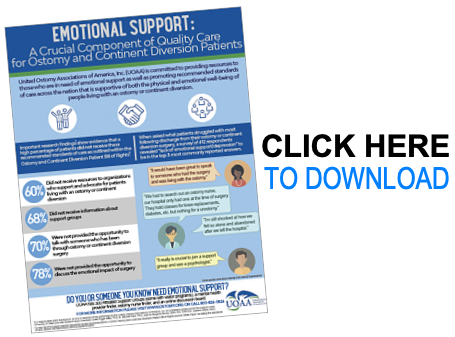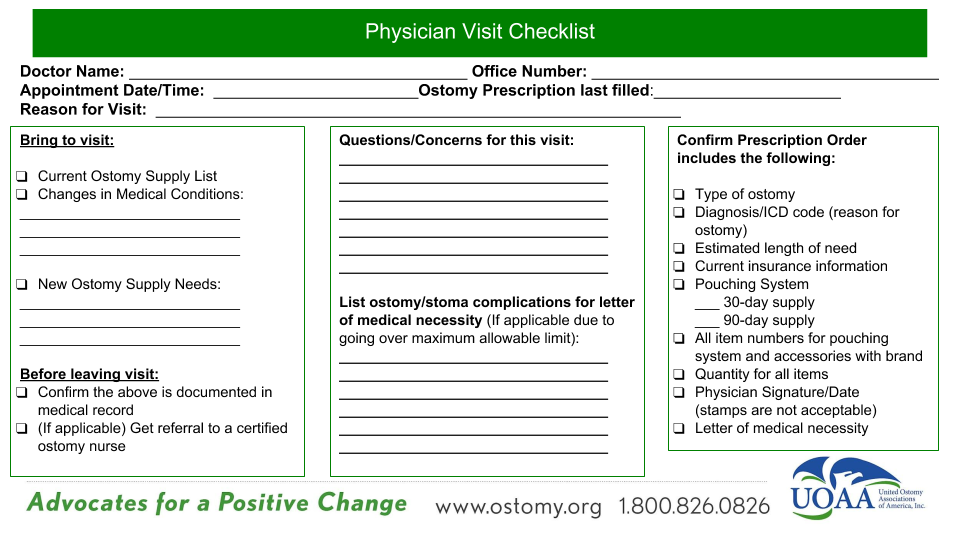Expect More – Take Control of Your Health Care
Part 6 in Series
By Joanna Burgess-Stocks and Keagan Lynggard-Hysell
There are many different emotions you may experience as a new ostomate, and it is important to understand that physical and emotional healing after surgery may follow different timelines. We understand that everyone copes with emotions differently. Some people struggle for a long time. Whether you would like to seek individual support from a social worker, therapist, or other medical professional or prefer support from a peer mentor or by attending a local support group; understanding the emotional impact of ostomy surgery and receiving the appropriate support is an important part of taking control of your health care.
Witnessing the Emotional Impact- a WOC Nurse’s Perspective
“Hello, my name is Joanna. I am here today because I am your ostomy nurse”.
I have repeated that sentence hundreds of times over the last 12 years. I am in the unique situation in that I am meeting you at a pivotal moment in your life, heading in a direction you might never have imagined–facing ostomy surgery. During that initial encounter I am sometimes met with a blank stare, a stunned look of fear and dread, or with complete relief. Whatever the reaction, I am the person that is there to help you navigate the world of living with an ostomy. I take great care during that initial visit to meet you where you are emotionally, knowing that this is a sensitive topic for you, someone who most likely is not used to talking about the way you go to the bathroom. Soon, however, I will share with you that I too am an ostomate (person living with an ostomy) and have been one for 53 years since the age of three! As I leave you that first day, I finally see a glimmer in your eyes–hope! A sign that maybe this journey is possible and that you are not alone.
As an ostomy nurse, I have had the opportunity to meet patients in a variety of settings and have worked with hundreds of patients facing ostomy surgery whether it be from cancer, bowel or bladder diseases or from emergent situations. No matter the reason, the anticipation of ostomy surgery is a step into the unknown and can compound the anger, sadness, and fear about the medical condition that caused you to need an ostomy. As you face these multitudes of feelings and adjust to life with an ostomy, know that you can take control of what may feel like an uncontrollable situation.
Facing the Emotional Impact- a Patient’s Perspective
“Good morning Keagan, today a special nurse is going to come and teach you how to care for your ostomy and help with your first bag change.”
A special nurse?–I thought to myself. Why do I need a special nurse to show me how to take care of my pouch? I had so many questions, a multitude of emotions, and I was feeling overwhelmed. So many things were out of my control, my recent diagnosis of Crohn’s disease, my hospitalization, my surgery, and now the responsibility of caring for my ostomy. I felt helpless and was eager for some independence in managing my body.
My WOC nurse entered the room and introduced herself with a smile. As she sat beside my bed listening to my fears and frustrations she explained how we were going to change my pouch. In an attempt to gain some independence, I told her that I wanted to take the pouch off myself and as I lifted the edge of the barrier just enough to see the edge of my stoma and the few black stitches poking through my skin– I lost it. I didn’t want to do it anymore, any of it. I didn’t want my insides on the outside, I was scared of my own body. My WOC nurse stepped right in with encouragement and support and a perspective I will never forget. She said she understood that what I was going through felt unmanageable but that caring for my stoma was something that would allow me to be self-sufficient, and that changing my pouch would give me independence in caring for my health. Since my very first pouch change, I have been encouraged to shift my perspective and to be proactive in the areas of my care where I can take control.
Seeking Individual Support
It is important for you to seek the resources needed to understand and work through the emotional impact related to ostomy surgery. It can be very helpful to have someone affirm your emotional concerns as you adapt to life with an ostomy. Most will find their path to acceptance as they physically begin to feel better and become comfortable with the care of their ostomy. If you are struggling with depression, how to tell others about your ostomy, or any part of the adaptation process (including the lack of will to learn self-care), seeking support through counseling can help you address these struggles. A licensed professional has the skills to help you create the life “tools” you need for navigating the unknown, including fears of introducing your ostomy into a new or existing relationship, addressing body image challenges, or understanding the grieving process. You can speak with your physician for a referral if needed.
Finding Support in Others
The fear of the unknown can often be soothed by learning from those who have gone through a similar experience. UOAA has approximately 300 Affiliated Support Groups throughout the United States, providing the opportunity for you to connect with others within your community who have also undergone ostomy surgery. To find a local support group near you, visit UOAA Support Group Finder. If you would like to connect with others but prefer to do so through an online format or from the comfort of your own home you can join a Virtual Support Group. Another way to gain support is through an ostomy mentor. Ostomate Lois Fink describes in her book Courage Takes Guts; Lessons Learned From A Lost Colon, meeting her mentor for the first time at a restaurant. The mentor was wearing a very slim dress and Lois felt perplexed, trying to figure out where she was hiding her ostomy pouch! Lois learned that she could be the same fashionista that she always was while wearing an ostomy pouch and it helped her face her ostomy surgery with more strength and confidence.
To learn how to connect with an ostomy mentor, many UOAA Affiliated Support Groups have certified visitor programs or you can contact UOAA for a list of current ASG visitor programs at 1-800-826-0826.
Our Hope for New and Struggling Ostomates
It is the hope of all of us at UOAA that one day you will be able to look at your stoma and see it as something that was life-altering and maybe even life-changing, but it was also life-giving. Be patient with yourself as you journey through both the physical and emotional healing process and be sure to utilize the available resources to support you every step of the way.
Crucial Role of Emotional Support – Infographic
Additional Information & Support
UOAA has developed several tools to help you navigate through various informational topics at your own pace. To help better understand what ideally should happen before and after ostomy surgery we have developed the Ostomy and Continent Diversion Patient Bill of Rights. To learn some of the common “ostomy lingo” you can refer to our blog Know Your Ostomy and Know Your Ostomy Pouching System and Supplies. Complete the accompanying checklists and keep them handy for your ongoing ostomy care.
As a new ostomy patient, you may have concerns or face many unknowns. UOAA provides resources to answer these frequent concerns and questions to best equip you in living with an ostomy. Here are a few of the ostomy educational resources available at ostomy.org:
- Do you have questions or feel unsure where to begin? Check out UOAA’s Frequently Asked Questions and New Ostomy Patient Guide
- Curious about travel? Air Travel Tips from UOAA and the TSA
- Interested in swimming? UOAA Swimming Toolkit
- Questions about diet? Ostomy Nutrition Guide
- Worried about intimacy? Ostomy and Sexuality
- How to Find a Mental Health Provider After Ostomy Surgery




